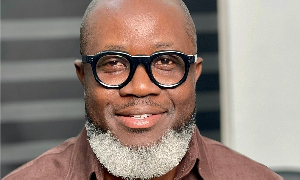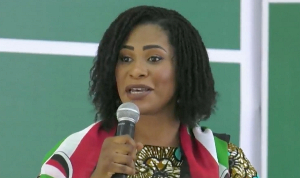Accra, Dec 3, GNA - The mass media in Africa is going through a period of great loss of credibility because there is an acute shortage of honest Journalists who would practice the profession with great conscience, says Professor Ralph Akinfeleye, head of the journalism department of the University of Lagos, Nigeria. He said presently in Africa, particularly Nigeria, Ghana, Senegal and Liberia, real journalists were lacking.
Prof Akinfeleye said this at the fourth Matriculation of 140 fresh students into the Africa Institute of Journalism and Training for a two-year Diploma in Communication Course in Accra on Saturday. Sixty nine percent of the 280 fresh students were female. The students are from Ghana, Nigeria, Chad, Sierra Leone and Togo.
Speaking under the topic: "So You Want To Be A Journalist; The Challenges Of The Journalist Of Conscience, Prof. Akinfeleye said African Mass media and broadcast in general had showed a dismal failure in their mission. "They have either by an act of commission or desperation missed the road and their utilities; credibility is now fading rapidly." He said the world's famous journalism of American broadcasting company were regarded as journalists of the first class order, who are regarded as international journalist with unimpeachable credentials.
Prof. Akinfeleye categorised Journalism practice in Africa into four categories - 'Cocktail Journalism', 'Journalism of the Next-of-kin, or cedi and 'Naira Journalism', 'protocol of journalists' and 'Journalism of the general order', saying, African journalist practice each one of these, or a combination. According to him, practitioners of 'Journalism of conscience' believed that the mass media was public trust and therefore were real journalists who saw themselves as trustees for public and acceptance of anything lesser than the public service was a betrayal of the trusteeship. "This group of journalists are well-trained either through formal or on the job track who believe and practice objectivity, fairness, accuracy, clarity and simplicity in their news reporting". Their strict adherence to professional ethics is to the extend that they do not fear intimidation of appointment as a result of objective and constructive criticism or exposure of skeletons in the closet of any of their bosses, he added.
Prof Akinfeleye held that as agenda setters, fearless writers have an immense role to play but because of greed, love for control of power, authority and money in Africa, there exist today this shortage of this category of journalists. "Perhaps as Africa continues to grow educationally, socially, politically, economically the tendency for cocktail, next-of kin, cedi and Naira and protocol journalists would diminish."
'Cocktail' Journalists were numerous and always found at parties, marriage ceremonies, chieftaincy installations, Prof Akinfeleye said, adding that "after they are heavily drunk and fed, they go back to the newsroom with heavy dressed-up and coloured news items of what did not happen at the cocktail." He said although journalists are supposed to cover parties, they should not compromise their credentials and professionalism with cocktailing.
Mr. Kojo Yankah, President of AIJC, said development communication would be institutionalised in the Institute's curricula and that early next year, the school would establish the Africa Centre for Development Communication to service the sub-region. He said efforts were being made to introduce distance learning to provide opportunities for those who could not physically be on campus, adding that from next academic year, online courses would be offered for applicants from the rest of the continent.
Mr. Yankah said the Institute's goal was to produce graduates who would go out owning laptops to facilitate their work and make a difference. He announced that the Institute had obtained a 20-acre plot near the Tema Motorway for the construction of new buildings and a hostel and that work would begin towards the end of 2006. The AIJC, which is affiliated to the Ghana Institute of Journalism for four years, is in its second year of affiliation. Mr Yankah said before the end of its affiliation, AIJC would be converted into a University of Communication Studies. He said the idea of concentrating on Information and Communication Technology, as a driving force in training was to expose students to modern and current ways in which information was being applied to build nations and develop skills.
"It is my contention that those who have little knowledge create problems for the communication profession, we want to make a mark in the country and on the continent and we shall pursue our goal with all determination and passion." He said AIJC was regularly expanding its network with relevant institutions both on the continent and outside to stay ahead in the training market. We are currently working out a partnership with the World Bank Institute in order to strengthen its capacity in training students in business and financial journalism and radio journalism.
General News of Saturday, 3 December 2005
Source: GNA












